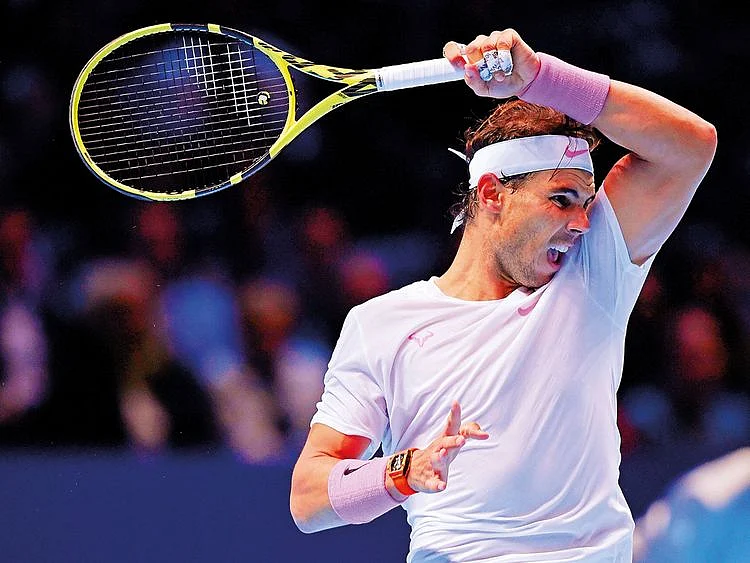Australian Open and a man named Rafa
Rafael Nadal is now the most successful tennis player of all time. That is no mean feat

Where do I begin for the beginning, itself is now a footnote? The distance covered from then to now can no longer be measured in years or overwhelming statistics, this journey has transcended into something almost ethereal where to strive is bigger than a dream and where legends remain human.
So, I have scribbled, erased, and reimagined but unlike his game, I continue to fall short. Perfection was in a comeback script for the times, an ode however flowing will never do it justice. Yet, I try.
After Rafael Nadal’s victory at the Australian Open, his friend and greatest rival penned a post that was all, us. In his tribute Roger Federer writes, “I am proud to share this era with you and honoured to play a role in pushing you to achieve more, as you have done for me for the last 18 years.”
Who will break it to these two gentlemen that forget friendship goals, the honour has solely been ours? That sports and its lovers could not have been more fortunate to witness an era that began in 2003 when a long- haired player fell on his knees and cried copious tears on the hallowed centre court of Wimbledon.
Since that victory by Federer these two have done everything to prove that it is truly a gentleman’s game, that a mere racket doesn’t make a player.
Naysayers will have their day rubbishing his precise down the line strokes, his savage forehand or simply even his display of brutal power despite him putting a ten year younger Medvedev on the mat and out of breath. They will also remind us that a tournament without Djokovic is null and void, but it is they who are missing the point of the game.
Boris Becker has a word for them, “You make a mistake if you still call Rafa, the clay court king. He has won on every surface and every Major at least twice. He is the most successful player of all time, we can say that loud and clear!”
Magic on a late Australian summer night
More than 16 years after he won his first slam, Rafa was back at the age of 35 with a body that had been bruised both by injury and Covid defying predictions, experts, and a marathon five- hour session to spell it out for us as though he understood we were still in a trance, enchanted by the magic on a late Australian summer night. “I gave it everything inside, believe me,” he said after the match. We believe him.
This is the same Spaniard had almost considered retirement after a foot injury last year that made him miss Wimbledon and the US Open. In September he was still on crutches.
How does one describe the comeback? Two sets and three breakpoints down when the fandom was divided between closing their eyes or the television sets, Nadal gave us a lesson on perseverance.
A body that looked to be slowing without enough gas to even shout vamos kept pushing one foot in front of the other till the points that looked unbreachable minutes ago began to be conquered and a game that was full of unforced errors soon mesmerised. The rhythm was back, he may have not been a poetry in slow motion and nor was this the time, but his fierce recovery nevertheless was a beauty.
Corporates can learn from his mantra of just hanging in and waiting for the tide to turn because when it did, 20 became a glorious 21- unmatched and sublime. The fight, the tears were all his, it was music that late night in Melbourne, but the swansong was no longer in the twilight zone.
Cult of glamour, swagger, and angry outbursts
What is it about Nadal that united a community emotionally? He is — at least no longer, made from the champion cloth that is cut from the cult of glamour, swagger, and angry outbursts.
His hair is dwindling, he still hugs his father as though he never left the nest — which he has not, and his humility is one for the books. Is it because he reminds us that there are no short cuts to success, that good guys also come first or is it because he keeps it simple with nothing is impossible?
For almost two decades, Federer and Nadal have shown that rivalry can also be healthy, that after a match ends, friendship begins. Even John McEnroe who was once the enfant terrible of tennis knows the difference calling Nadal “humblest, classiest champion of almost every athlete I’ve ever seen in any sport.”
Those shoulders could easily crumble with this pressure, knowing what we do of Nadal though he will shrug it off and continue training.
I was in school when Rocky Balbao barged into our lives and the song Eye of the Tiger with its theme of survival and revival became an anthem. Rocky was the story of a young man — an underdog, boxing his way against the odds, to claim glory.
Going into the final of the Australian Open Nadal was Rocky the underdog, the money was on Medvedev, a younger and fitter player who was in great form.
Legacies though are built on more than just fable and after Melbourne, we have our real life ending. Next time you are down and out, remember what Rafa would have done, “I can lose, he can win, but I can’t give up.”
Network Links
GN StoreDownload our app
© Al Nisr Publishing LLC 2026. All rights reserved.